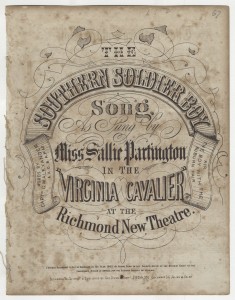By: Clay A. McCollum, Master’s student in the School of Music
George Washington Alexander’s “The Southern Soldier Boy,” an aria from his 1863 The Virginia Cavalier, stands out among the wealth of Confederate imprint sheet music housed in the W.S. Hoole Special Collections Library at The University of Alabama due to its widespread popularity with Confederate soldiers.
Alexander, who is most known as the commandant of a Confederate POW camp (Castle Thunder) outside of Richmond, Virginia, set “The Southern Soldier Boy” to the preexisting tune or air known as Gilderoy.
Sallie Partington, who created the aria when Cavalier opened at The Richmond New Theatre, is advertised with great pomp on the composition’s cover page. Jeanne Robert Foster, who edited “Songs of the War Days,” the Appendix to the ninth volume of The Photographic History of The Civil War in Ten Volumes, says that “the sentiments of this song [“The Southern Soldier Boy”] pleased the Confederate Soldiers, and for more than a year, the New Richmond Theatre was nightly filled by ‘Blockade Rebels,’ who greeted with wild hurrahs, ‘Miss Sallie’ [(Partington)] the prima donna of the Confederacy.”
Frances H. Casstevens’s George W. Alexander and Castle Thunder: A Confederate Prison and Its Commandant (2004) may be the very best window into understanding Alexander. She says in introducing him, “While some people viewed Alexander as being a harsh and cruel man, he was also ‘sensitive,’ and had a talent for musical composition.” Alan Lawrence Golden corroborates this characterization in his master’s thesis: “There was another side to Alexander’s personality that was far removed from the accusations of his cruel and injudicious treatment of his prisoners. Possessing what some called a sensitive, artistic talent for musical composition, he wrote a ballad entitled ‘Southern Soldier Boy[,]’ which became an important part of the Richmond musical review ‘The Virginia Cavalier’ [sic]” (32).
Disappointingly, given the hype, “The Boy with the Auburn Hair,” or Gilderoy, offers very little interest harmonically. In general and really without much exception, a melody is sung over the root-position i chord in the key of F minor; there are also two brief forays into the relative major key.
The Virginia Cavalier played to Richmond audiences from 16 March 1863 through 22 June 1864. This musical play is a noteworthy contribution to the great outpouring of poetry, songs, and drama about the South, its soldiers, and their loved ones that culminated in and around Richmond during the War.

